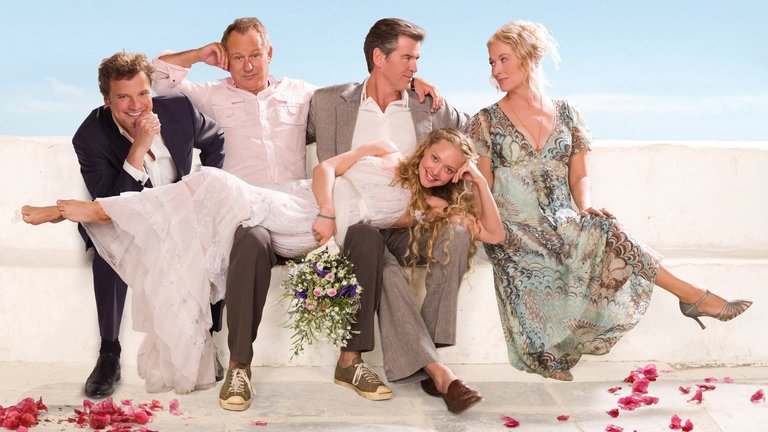
As time passes, it is difficult to avoid the impression that rock 'n' roll is one of the most overrated cultural phenomena of the 20th century. This once heretical view is best confirmed by the fact that ABBA, the Swedish band known for its sugary pop songs, still captivates audiences today as it did in the 1970s, while Led Zeppelin, Deep Purple, and their contemporaries, once hailed as masters of rock, live only in the nostalgic niche ghettos of television channels like VH1.
In 1999, a stage musical composed solely of ABBA's greatest hits became one of the world's sensations. Although there had been films based more or less on the music of this Swedish group before—most notably the Australian black comedy Muriel's Wedding from 1994—it was inevitable that this theatrical piece would receive its film adaptation. Given all of the above, it was equally inevitable that Mamma Mia! would become the most successful Hollywood musical of all time, grossing nearly $700 million.
The film's plot unfolds on the small Greek island of Kalokairi, where 20-year-old Sophie Sheridan (played by Amanda Seyfried) lives with her mother Donna (played by Meryl Streep), who owns a local hotel. Sophie is about to marry young Sky (played by Dominic Cooper), but before that, she wants to discover who her father is. After finding her mother's diary, she decides to invite three possible candidates to her wedding: Swedish adventurer Bill (played by Stellan Skarsgård), banker Harry (played by Colin Firth), and architect Sam (played by Pierce Brosnan). The trio arrives on the island believing they have been invited by Donna. To keep her company, Donna's old friends—celebrity chef Rosie (played by Julie Walters) and free-spirited divorcee Tanya (played by Christine Baranski)—join her.
The plot, inspired by the 1968 Hollywood comedy Buona Sera, Mrs. Campbell featuring Gina Lollobrigida, can be described as lightweight and filled with clichés that even writers of ancient comedy might recognise. On the other hand, this framework is sturdy enough to accommodate as many as 22 ABBA songs in the film.
Phyllida Lloyd, who directed the first stage version of the musical, lacks significant experience in film or television, but viewers are unlikely to notice. Many scenes are surreal and absurd yet quite imaginative, including musical numbers literally accompanied by a Greek chorus. Fans of ABBA and musical theatre should find satisfaction—if only producers hadn't come up with the not-so-bright idea for every actor to not only act but also sing their roles.
In some cases, this wasn't too bad, as with Seyfried, who boasts an impressive voice. Meryl Streep, known for her gravely serious acting roles, had already showcased her singing talent in Postcards from the Edge and A Prairie Home Companion, while Christine Baranski is a pleasant surprise. However, for viewers who value their ears, Pierce Brosnan's singing—or attempts at singing—will be a significant challenge. The result resembles scenes from karaoke bars in late-night hours and represents a violation of European cultural heritage.
Fortunately, Brosnan's role is relatively limited; thus, regardless of whether nostalgia for ABBA resonates or not, audiences will generally have reason to be pleased with this light-hearted yet charming product of Hollywood entertainment.
Ten years later, a sequel titled Mamma Mia! Here We Go Again was released, becoming another huge success.
RATING: 6/10 (++)
Blog in Croatian https://draxblog.com
Blog in English https://draxreview.wordpress.com/
InLeo blog https://inleo.io/@drax.leo
Hiveonboard: https://hiveonboard.com?ref=drax
InLeo: https://inleo.io/signup?referral=drax.leo
Rising Star game: https://www.risingstargame.com?referrer=drax
1Inch: https://1inch.exchange/#/r/0x83823d8CCB74F828148258BB4457642124b1328e
BTC donations: 1EWxiMiP6iiG9rger3NuUSd6HByaxQWafG
ETH donations: 0xB305F144323b99e6f8b1d66f5D7DE78B498C32A7
BCH donations: qpvxw0jax79lhmvlgcldkzpqanf03r9cjv8y6gtmk9